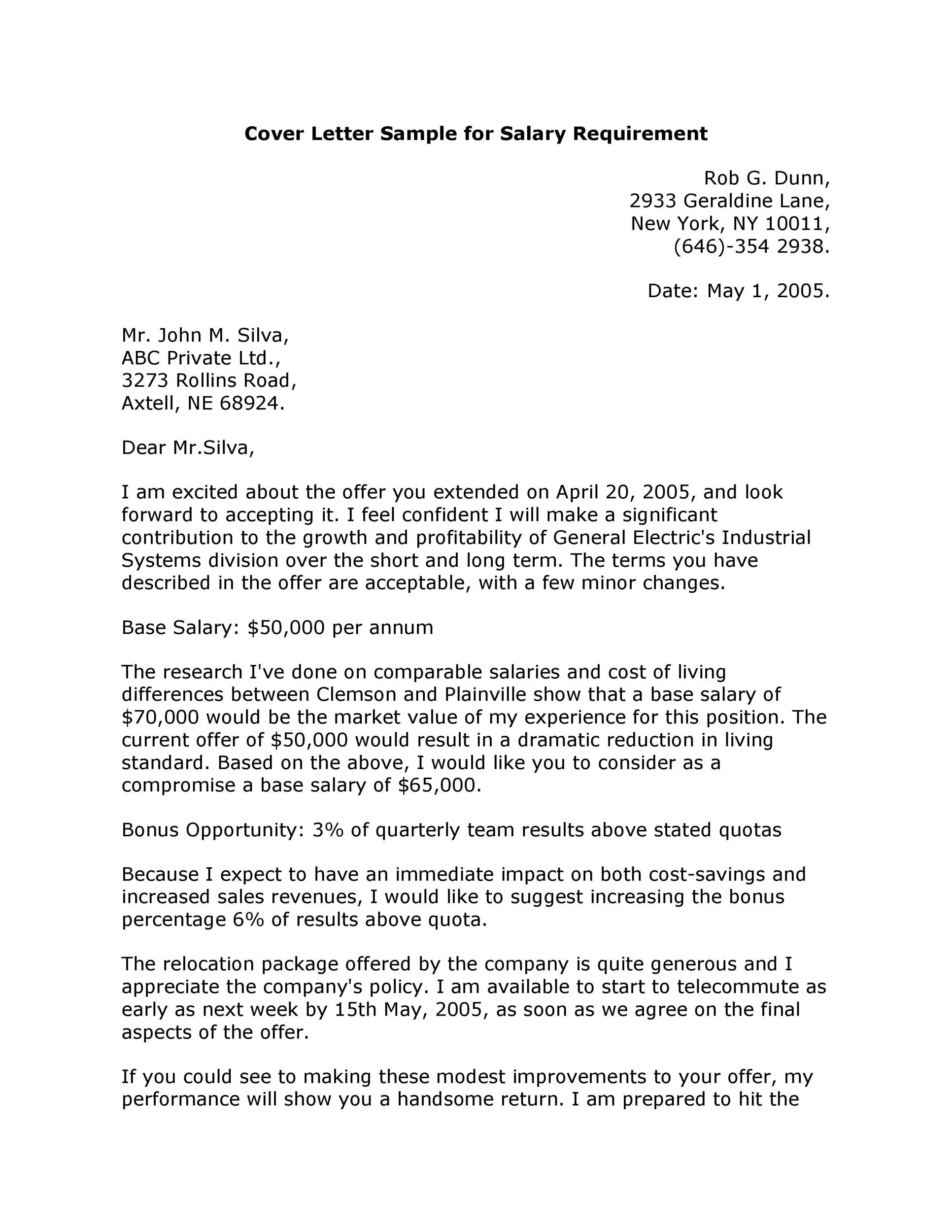Understanding the Importance of Salary in Cover Letters
The salary component of your cover letter is a crucial element, often overlooked yet highly influential in the job application process. It’s not just about stating a number; it’s about demonstrating your understanding of the job market, your self-worth, and your ability to align your expectations with the employer’s budget. A well-crafted salary statement in your cover letter can significantly improve your chances of getting noticed, invited for an interview, and ultimately, securing the job offer you desire. Conversely, mishandling this aspect can lead to immediate disqualification or a less-than-ideal compensation package. Therefore, mastering the art of discussing salary in your cover letter is a strategic advantage.
Why is Salary Information Necessary?
Employers need to know your salary expectations early in the process for practical reasons. Firstly, it helps them filter candidates based on their budget. Companies allocate specific funds for each role, and knowing your salary requirements upfront allows them to quickly assess whether your expectations align with their financial capacity. Secondly, it sets the stage for negotiation. By including this information, you demonstrate your understanding of the role and your value. It indicates that you have considered your worth within the market and have a reasonable expectation for compensation. Not providing salary information can sometimes lead to delays or misunderstandings later in the hiring process.
Benefits of Including Salary Expectations

Including salary expectations in your cover letter has several advantages. It shows that you have considered your financial needs and are serious about the position. It helps prevent the wasting of time for both you and the employer if the salary expectations are not aligned early in the process. Providing this information demonstrates your professionalism and initiative. It also gives you an opportunity to frame your expectations in a positive light, possibly highlighting your willingness to negotiate based on the overall compensation package, including benefits and other perks, thereby providing the employer a clear view of your financial needs and expectations.
When to Disclose Salary Expectations
The timing of disclosing your salary expectations is essential. If the job posting explicitly requests salary requirements, it’s best to provide it in your cover letter. If the posting doesn’t explicitly request it, there is no strict requirement, but including a salary range is usually a good practice, particularly for roles where compensation is easily researchable, or in certain industries. Be cautious if the posting discourages including salary information; in such cases, it might be best to avoid it initially, but be prepared to discuss it during the interview. The goal is to strike a balance between providing the necessary information and not prematurely limiting your earning potential.
Researching Salary Ranges
Before including salary information, thorough research is essential. This research helps ensure that your expectations align with the industry standards and the specific role. It also allows you to negotiate your salary with confidence. Understanding the market rate for your position gives you the upper hand during negotiations. Research ensures that you are neither under-valuing yourself nor pricing yourself out of the running. Tools like Glassdoor and Salary.com, offer valuable insights into salary bands, helping you make an informed decision when stating your expectations.
Utilizing Online Salary Resources

Numerous online resources can help you determine the appropriate salary range for your desired role. Websites like Glassdoor, Salary.com, and Payscale provide detailed salary information based on job title, location, experience level, and industry. These resources often collect data from multiple sources, including self-reported salaries and company-reported data. When using these sites, filter your search by location and experience level to ensure relevance. Remember that these are estimates, and actual salaries can vary. Consider your specific skills, education, and the size and type of company when interpreting these figures. Take the time to look at multiple sources to get a comprehensive view.
Company and Industry Salary Research
In addition to general salary websites, research the specific company and industry to get more accurate salary expectations. Company websites, news articles, and industry reports can give you clues about the company’s financial health and compensation practices. Look at similar roles within the same industry and in the same geographic location to get a better understanding of the market rates. Consider the size and revenue of the company. Large, established companies often pay more than startups or smaller organizations. Understanding the company’s financial performance can help you gauge their ability to pay competitive salaries. Use this detailed information to tailor your salary expectations and prepare for negotiations.
Understanding Salary Negotiation
Salary negotiation is a crucial part of the hiring process. It’s your opportunity to discuss your worth and reach an agreement that benefits both you and the employer. Successful negotiation is based on a blend of research, confidence, and effective communication. Approach the negotiation with a positive attitude, emphasizing the value you bring to the role. Be prepared to justify your salary expectations with specific examples of your skills and accomplishments. Remember that negotiation isn’t just about the base salary. It also encompasses benefits, bonuses, and other perks, giving you many avenues for reaching a favorable agreement. The goal is to find a mutually beneficial arrangement that makes you feel valued and motivated.
Preparing for Salary Discussions
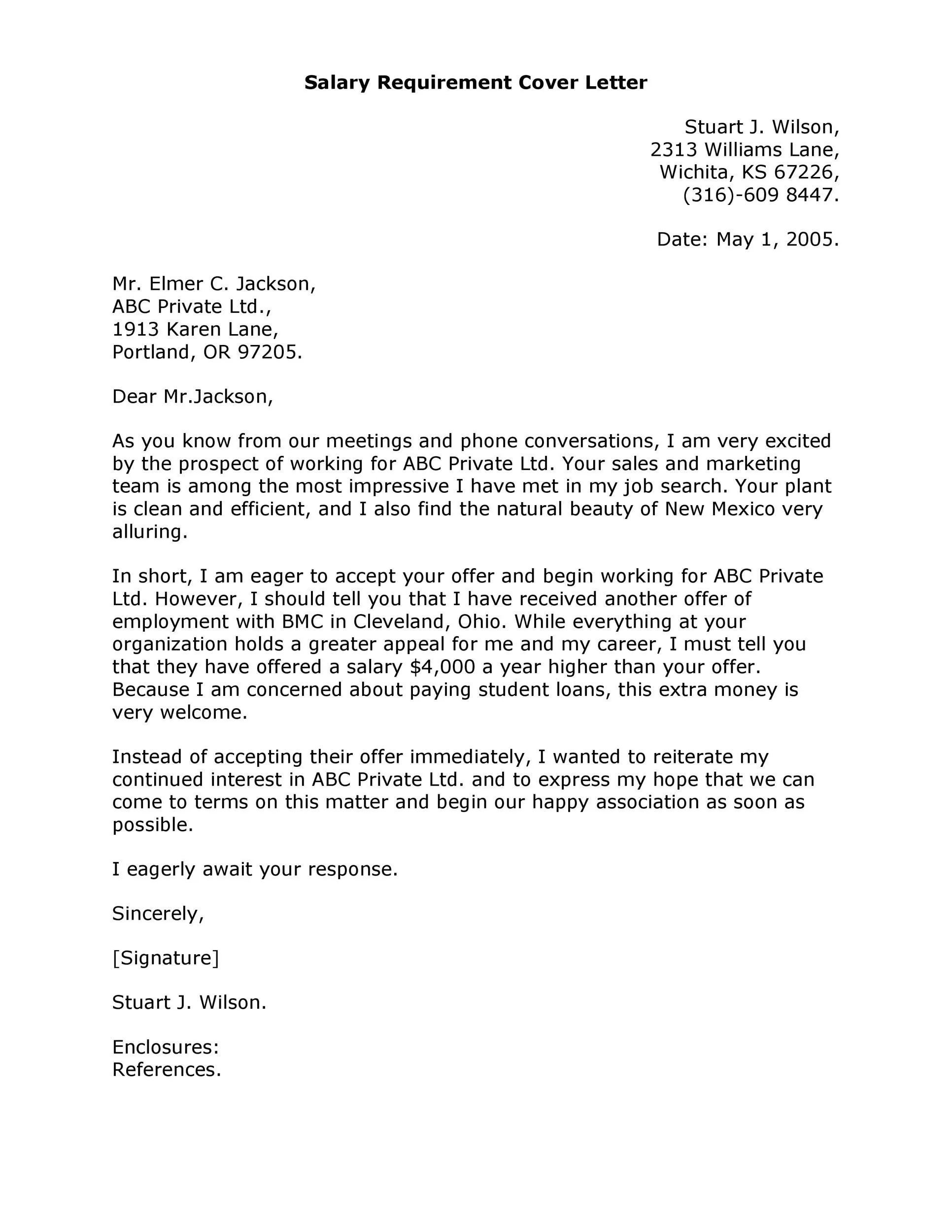
Preparation is key to a successful salary negotiation. Review your research on salary ranges for the specific role and location. Prepare a list of your accomplishments and skills that demonstrate your value and worth. Practice discussing your salary expectations and answering potential questions. Have a clear understanding of your financial needs and what you are willing to accept. Prepare for different scenarios, such as the employer offering a lower salary or asking about your previous salary. Remain flexible, and be prepared to negotiate not just the base salary, but also other benefits like health insurance, vacation time, and bonuses. Be ready to justify your worth and to demonstrate your enthusiasm for the role.
Highlighting Your Value and Experience
When discussing your salary expectations, highlight your value and experience. Use specific examples from your past roles to illustrate your achievements and skills. Quantify your accomplishments whenever possible by using numbers and data. For example, mention how you increased sales by a specific percentage, improved efficiency by a specific margin, or successfully managed a project within a given budget. These examples show the employer the value you can bring to the position. Tailor your examples to the specific requirements of the job to demonstrate the relevance of your skills. Emphasize any unique skills or certifications that make you a valuable candidate.
Negotiation Strategies
Several negotiation strategies can help you achieve a favorable outcome. One effective approach is to state your desired salary as a range. This gives the employer some flexibility while still indicating your expectations. Another strategy is to delay the salary discussion until you receive a job offer. This allows you to showcase your value and build rapport with the employer before discussing compensation. When the offer comes, don’t accept immediately. Take time to review the offer, consider all aspects of the compensation package, and be prepared to negotiate. Be confident, professional, and willing to compromise. If the salary is not within your range, you can negotiate by proposing a counteroffer or mentioning alternative benefits.
Crafting Your Cover Letter
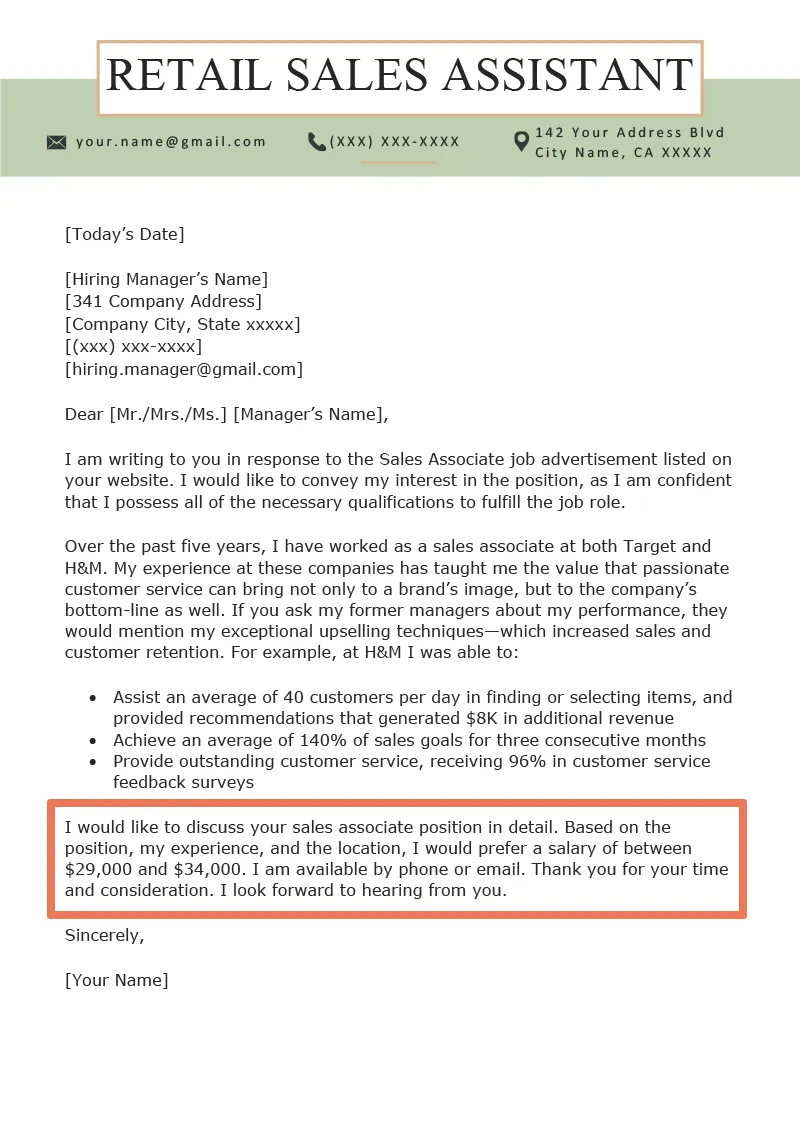
Your cover letter serves as your first introduction to a potential employer, so pay close attention to detail when discussing your salary expectations. The way you phrase your expectations significantly impacts the impression you make. Be professional, confident, and specific in your statements. Avoid ambiguous language and use precise language to demonstrate that you understand the role and are certain of your value. A well-crafted cover letter increases your chances of securing an interview and a favorable salary offer.
Formatting Salary Information in the Cover Letter
When including your salary expectations in the cover letter, choose the right location. Generally, it’s best to mention your expectations towards the end of the letter, after highlighting your skills and expressing your interest in the role. This approach ensures that the employer has already seen the value you offer before considering your salary expectations. Use a clear and concise statement such as ‘My salary requirements are in the range of [dollar amount] to [dollar amount]’ or ‘I am seeking a salary commensurate with my experience and the responsibilities of the role.’ Make sure the formatting is professional and aligns with the overall tone of your letter.
Phrasing Salary Expectations Effectively
How you phrase your salary expectations affects the impression you create. Avoid being too rigid by providing a specific range instead of a single number. Use phrases like ‘I am seeking a salary range between…’ or ‘My salary expectations are aligned with…’ This shows your flexibility and willingness to negotiate. Frame your expectations in terms of value. For example, state that you are ‘seeking a salary commensurate with the role and my qualifications’. Avoid phrases that might sound demanding or negative, such as ‘I expect to be paid’ or ‘I will not accept less than’. Use positive language that highlights your understanding of the job market and your confidence in your skills.
Examples of Effective Cover Letter Salary Statements
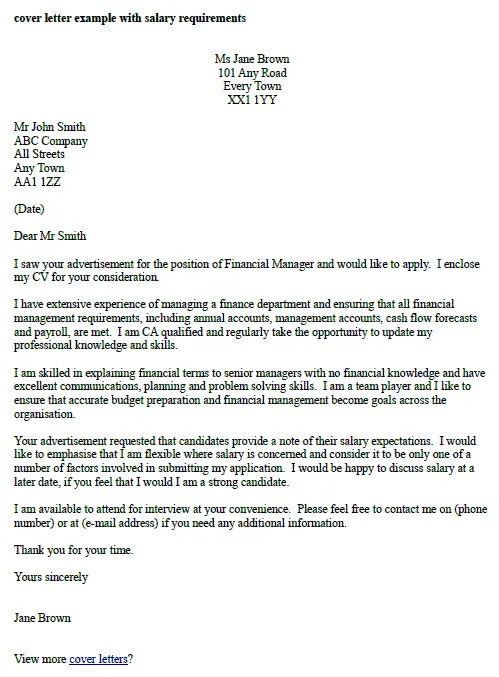
Here are some effective examples of salary statements you can use in your cover letter:
- “I am seeking a salary in the range of $60,000 to $70,000, commensurate with my experience and the responsibilities of the position.”
- “Based on my research and experience, I am targeting a salary between $75,000 and $85,000.”
- “My salary expectations are aligned with the market rate for a [Job Title] in [Location], and I am open to discussing the details during the interview.”
- “I am seeking a competitive salary, and I am eager to learn more about the compensation package, including benefits.”
Adapt these examples to match the specific requirements of the job and your individual circumstances. Remember, the key is to be clear, confident, and professional when stating your expectations.
Dealing with Salary Questions
Anticipate potential salary questions during the interview and prepare your responses. Employers may ask about your salary expectations early in the process, so be ready to answer confidently and informatively. Prepare by practicing your answers, researching the market rate, and understanding your value to the employer. Your responses should show that you’ve considered the role, the company, and the industry standards. Be prepared to answer questions on your past salary, if required, and be ready to negotiate the base salary. The best approach is to strike a balance between transparency and strategic thinking.
What to Do if the Salary Isn’t Listed
If the job posting doesn’t specify a salary, you have several options. If you are comfortable doing so, you can mention a salary range in your cover letter. Alternatively, you can defer the discussion until later in the process, perhaps until the interview. In your cover letter, you might state something like, ‘I am eager to discuss my salary expectations during the interview, based on the role’s responsibilities and my experience.’ Always do your research to determine a reasonable salary range based on your position, and be prepared to discuss your value during the interview. This enables you to show your interest without making a premature financial commitment.
How to Handle Unrealistic Salary Expectations
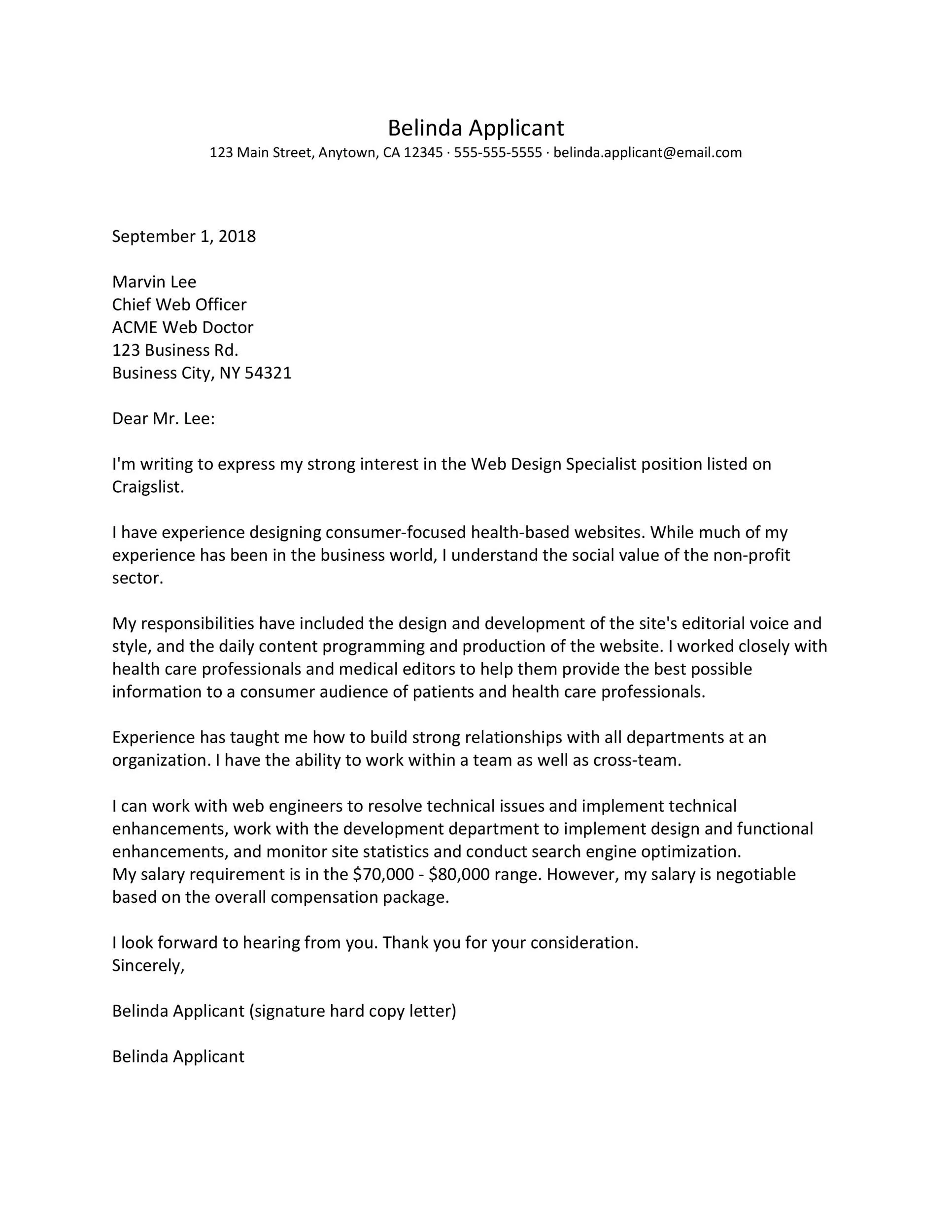
If the employer offers a salary that doesn’t meet your expectations, approach the situation thoughtfully. First, express your appreciation for the offer. Then, highlight your value and explain why you believe a higher salary is justified. Present your arguments with facts and data, referencing your experience and achievements. Be prepared to negotiate; don’t simply accept the offer without trying to reach an agreement that fits your needs. Be willing to consider other benefits or perks, like additional vacation time or professional development opportunities, if negotiating the base salary is not possible. Show that you are willing to find a solution that works for both you and the employer.
Common Mistakes to Avoid
Several common mistakes can harm your chances of securing a favorable salary offer. One is failing to research the market rate for the role. This can result in underestimating your worth and negotiating a lower salary. Another mistake is providing a salary that is too high, which can cause the employer to disregard your application. Being vague or hesitant about your salary expectations can also hurt your chances. Always be prepared, confident, and specific about your requirements to create a positive impression.
Avoid Lowballing Yourself
One of the most common mistakes is undervaluing yourself. Don’t underestimate your worth or be afraid to ask for what you deserve. Research the market rate and understand the value of your skills and experience. Consider all aspects of your total compensation, including benefits. Prepare to explain why you are requesting your salary and justify your expectations with specific examples and accomplishments. Remember, a salary negotiation is about achieving a fair and mutually beneficial agreement.
Don’t Be Afraid to State Your Worth
When it comes to discussing your salary, don’t be afraid to state your worth. Understand your skills, accomplishments, and how they relate to the job requirements. Back up your expectations with data and facts from your career. Be confident in your ability to add value to the organization. Salary negotiation is an opportunity to showcase your value and secure a fair wage. Believe in yourself and your abilities; remember that you deserve to be compensated fairly for your time and effort. By doing your research, preparing, and approaching the negotiation with confidence, you can get the salary you deserve.
Conclusion
Effectively addressing salary expectations in your cover letter and throughout the hiring process is critical to achieving your career objectives. By researching, preparing, and confidently communicating your value, you can improve your chances of securing the desired salary. Remember to frame salary conversations as a negotiation, where both the employer and you come to a mutually beneficial arrangement. Mastering these techniques will not only help you get the salary you deserve but also demonstrate your professionalism and enhance your overall prospects for future employment. Approach this aspect with knowledge, confidence, and a strategic mindset for best results.
